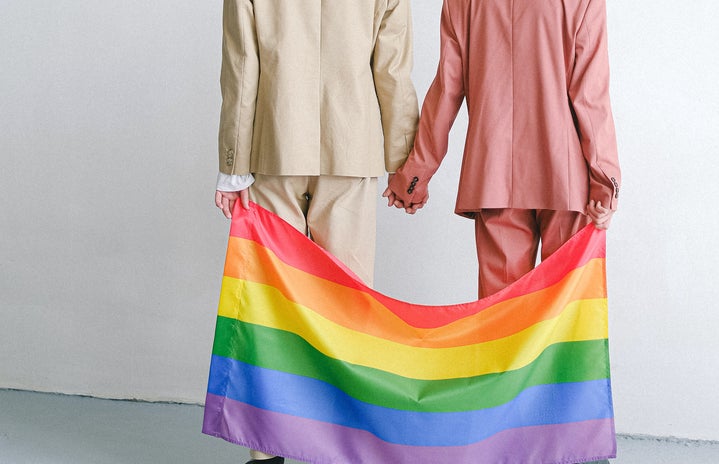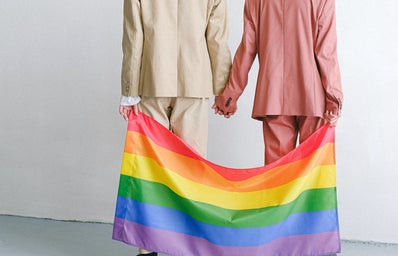The LGBTQ community includes some of the coolest people I have ever met. I have so much respect and awe for people who live authentically. Like many people I know, I desperately want to be a good ally. I want to show friends and strangers that I am a friend and support them however they choose to live their lives.
But sometimes allyship is hard. The pressure to know terminology and appropriate language can feel like a trap. Occasionally, people, including myself, are so eager and interested in understanding one another that we end up asking invasive or inappropriate questions.
Allyship is important, but it isn’t always simple or unintimidating. The world is changing every day, and it is hard to keep up. The best thing we can do is try.
I am a straight lady studying theories and politics of sexuality, and boy have I learned a lot. Even so, I’m a constant screw-up when it comes to understanding queer communities. Right when I think I know something, it gets flipped on its head, and I look like a doof. Through all my blunders, I have maintained a mantra.
My middle school math teacher once told me, “Respect is not treating people the same way you want to be treated, but rather treating people how they want to be treated.” From my experience, allyship is about doing your best to be respectful and supportive. I am going to give you the tips I follow to attempt to be just that.
The first and most helpful tip that I have been given is if a question would be weird to ask a cisgender, straight person, it probably isn’t cool to ask a queer person. For example, “How did you know you were straight?”, “Who’s the top in the relationship?” or “What do your parents think about you being straight?” come off as invasive and would never be asked of a straight, cis person. So don’t ask the inverse of a random queer person.
Nevertheless, that doesn’t mean you shouldn’t ever ask questions to LGBTQ people. The best way to learn is from each other! Having a trusted person who can answer the hard questions and give perspective is a great idea. I have learned a lot from open “Pride Panels” where you can ask representatives about their experiences. I would also recommend the book “The Savvy Ally” to anyone who wants to learn more about the LGBTQ community from an ally-centered perspective.
Also, you might wonder why I am using the word cis or cisgender. Cisgender means a person’s gender identity that aligns with what they were assigned at birth. It is a newish word, but it is used to differentiate cis, trans or nonbinary people. It’s there so you don’t have to call cis people normal. This would imply that trans people are somehow not normal. In the same way, you should say straight and gay, not normal and gay.
Next, pronouns are tricky. We might have our Rihanna moment trying to be inclusive, where she famously said, “Both men and women and nonbinary people of all gender appropriations and the pronouns.” I get it. It can be so confusing.
If you don’t know what to call a person, you can ask, “How can I best refer to you?” This allows them to share a preferred name or pronoun without pressuring them to come out or get personal if they aren’t comfortable. You can also use a mirror strategy and mirror how other people refer to that person. As for changing your pronoun usage, this can be tricky. I know I always mess up and call Dylan Mulvaney “he,” not because I don’t respect her as a trans woman, but because I associate the name Dylan as being a masculine name. When we make mistakes like this, it isn’t helpful to make a big deal about it and grovel an apology. That draws unwanted attention to both of you. The best tip I have is to correct yourself the next time to show that it was unintentional, or just say “pardon, (correct pronoun)” and move on.
If someone you know refuses to use correct pronouns and you’d like to advocate for a change, this is the best strategy I know. Be kind and hear people out. This is a big change for many people, and coming at them with anger will make them run back to their old beliefs. I always think a comparison is helpful. For me, I reminisce on when my mom went through chemo and was called sir when she was bald. She was so upset. Gender is important to most of us, not just queer people. I can’t imagine feeling like that every day, but that is how many trans people feel. It’s a small kindness from you that can feel huge for them when the people close to them try.
Another tip is to throw out some of your assumptions. I made the mistake last year of calling a lesbian couple sisters because they had the same last name, and I made an incorrect assumption. One newlywed wife came to me crying about the mistake and I felt like crap. But instead of loathing, I made sure to use the term family in the future when I saw matching last names. It was honestly an easy fix, just something I never took the time to consider before. Using terms like partner instead of husband or wife with people you don’t know gives everyone the chance to feel included. You’re not a bad person if you don’t, but it might save you and them an uncomfortable correction.
My last tip is to keep an open mind. If somebody corrects you, don’t shut down, hear them out. If their thought process makes sense, then thank them and move forward knowing better. And if it doesn’t, then move forward respectfully. That is all we can do.
Allyship isn’t about fighting every battle. It isn’t about cussing out every internet troll or screaming at someone who uses the wrong terminology. It isn’t about going to every pride festival or memorizing all the sexuality terms and flags. It is about putting in effort to make the people around you feel comfortable and respected.


